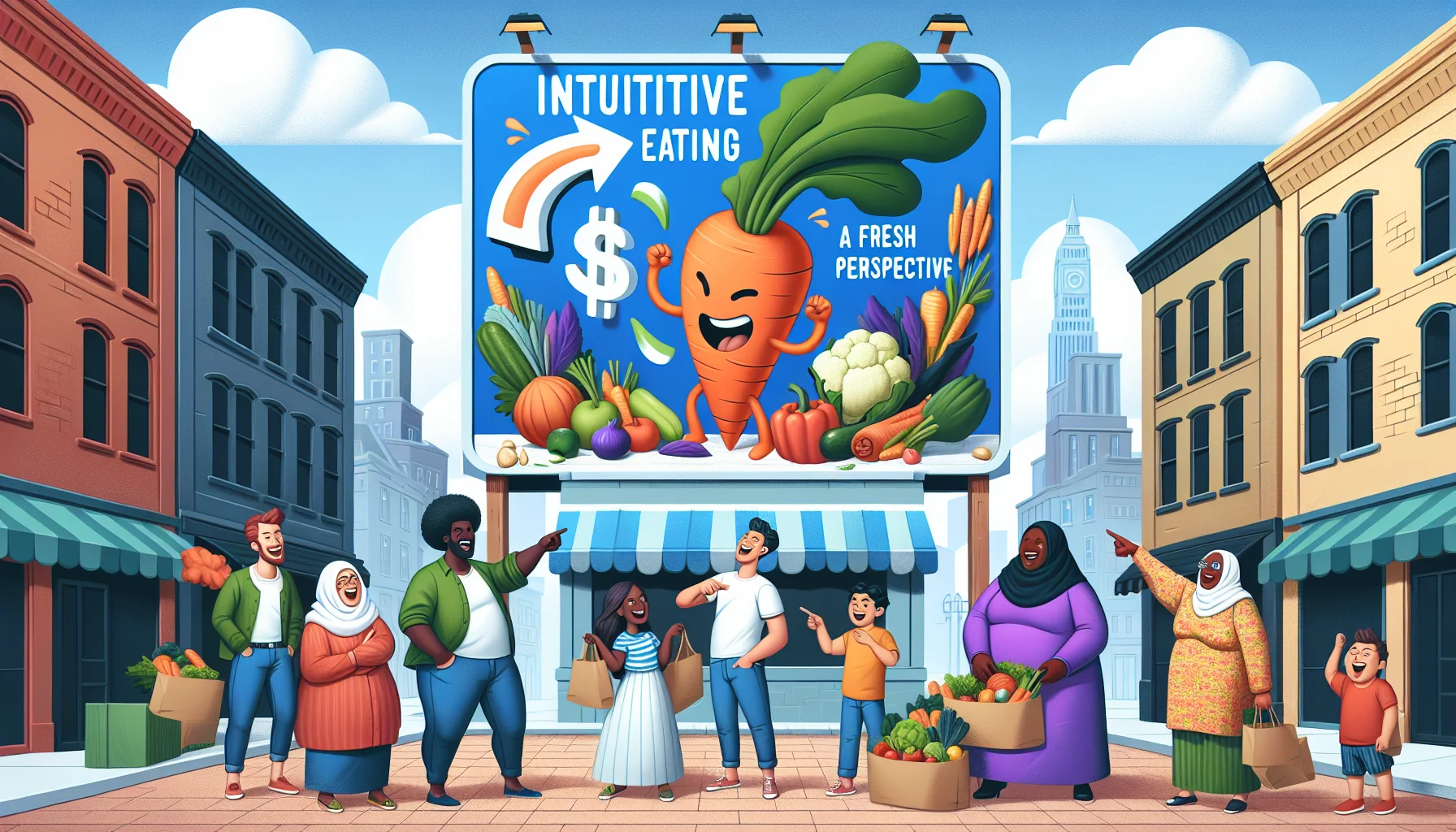Intuitive Eating: A Fresh Perspective Quiz
Test Your Knowledge
Question of
Intuitive Eating: A Fresh Perspective
Intuitive eating is a holistic approach to nutrition and wellness that encourages individuals to listen to and honor their body's hunger and fullness cues. Unlike traditional diets that impose strict rules and restrictions, intuitive eating promotes a trusting relationship with food and body. It emphasizes the importance of rejecting the diet mentality, understanding one's own physical hunger signals, and making food choices that feel good to the body without experiencing guilt or an obligation to exercise. This approach helps in breaking the cycle of chronic dieting, fostering a positive body image, and supporting long-term health. By focusing on internal cues rather than external diet rules, intuitive eating paves the way for a healthier and more satisfying relationship with food and oneself.
The 10 Principles of Intuitive Eating
- Reject the Diet Mentality: Throw out the diet books and magazine articles that offer you false hope of losing weight quickly, easily, and permanently.
- Honor Your Hunger: Keep your body biologically fed with adequate energy and carbohydrates. Otherwise, you can trigger a primal drive to overeat.
- Make Peace with Food: Call a truce, stop the food fight! Give yourself unconditional permission to eat. If you tell yourself that you can’t or shouldn’t have a particular food, it can lead to intense feelings of deprivation that build into uncontrollable cravings and, often, bingeing.
- Challenge the Food Police: Scream a loud "no" to thoughts in your head that declare you’re "good" for eating minimal calories or "bad" because you ate a piece of chocolate cake.
- Discover the Satisfaction Factor: The Japanese have the wisdom to promote pleasure as one of the goals of healthy living. In our fury to comply with diet culture, we often overlook one of the most basic gifts of existence - the pleasure and satisfaction that can be found in the eating experience.
- Feel Your Fullness: Listen for the body signals that tell you that you are no longer hungry. Observe the signs that show that you’re comfortably full. Pause in the middle of eating and ask yourself how the food tastes, and what is your current fullness level?
- Cope with Your Emotions with Kindness: First, recognize that food restriction, both physically and mentally, can, in itself, trigger loss of control, which can feel like emotional eating. Find kind ways to comfort, nurture, distract, and resolve your issues without using food.
- Respect Your Body: Accept your genetic blueprint. Just as a person with a shoe size of eight would not expect to realistically squeeze into a size six, it is equally futile (and uncomfortable) to have a similar expectation about body size.
- Movement—Feel the Difference: Forget militant exercise. Just get active and feel the difference. Shift your focus to how it feels to move your body, rather than the calorie-burning effect of exercise.
- Honor Your Health—Gentle Nutrition: Make food choices that honor your health and taste buds while making you feel well. Remember that you don’t have to eat perfectly to be healthy. You will not suddenly get a nutrient deficiency or become unhealthy from one snack, one meal, or one day of eating. It’s what you eat consistently over time that matters.
The Science Behind Intuitive Eating
Scientific research and evidence increasingly support the effectiveness of intuitive eating for health and well-being. Intuitive eating, a philosophy of eating that makes you the expert of your body and its hunger signals, essentially advocates eating in response to physiological hunger cues instead of emotional or situational cues. Studies have shown that individuals who practice intuitive eating have a healthier psychological attitude towards food and eating, lower rates of disordered eating, and greater body satisfaction. Moreover, research indicates that intuitive eating practices are associated with better metabolic health markers, including improved cholesterol levels and blood pressure. This holistic approach to eating and health encourages individuals to listen to their bodies, eat foods that satisfy them, and ultimately, can lead to a more positive and healthy relationship with food and one's body.
Intuitive Eating vs. Diet Culture
Intuitive eating and traditional dieting approaches stand on opposite ends of the spectrum when it comes to how we relate to food and our bodies. Unlike the restrictive nature of diet culture, which often promotes counting calories, adhering to strict meal plans, and labeling foods as "good" or "bad," intuitive eating encourages a more harmonious relationship with food. It emphasizes listening to the body's hunger cues, eating foods that satisfy both the body and the palate, and rejecting the guilt often associated with eating. This approach fosters a healthier body image, reduces the cycles of dieting and weight gain, and supports long-term well-being. In contrast to the stress and anxiety that can accompany traditional diets, intuitive eating promotes peace with food and an acceptance of the body's natural diversity.
How to Start Practicing Intuitive Eating
- Reject the Diet Mentality: Stop following diet trends that offer temporary weight loss solutions.
- Honor Your Hunger: Learn to recognize signs of hunger and feed your body as needed.
- Make Peace with Food: Give yourself unconditional permission to eat what you want without guilt.
- Challenge the Food Police: Silence the internal and external voices that tell you what you should or shouldn't eat.
- Discover the Satisfaction Factor: Find pleasure and satisfaction in the eating experience to feel content and full.
- Feel Your Fullness: Listen to your body signals that tell you that you are no longer hungry.
- Cope with Your Emotions Without Using Food: Find ways to deal with stress and emotions without turning to food for comfort.
- Respect Your Body: Accept your body as it is and recognize its diversity in shapes and sizes.
- Exercise—Feel the Difference: Focus on how it feels to move your body rather than the calorie-burning effect of exercise.
- Honor Your Health—Gentle Nutrition: Make food choices that honor your health and taste buds while making you feel well.
Common Myths and Misconceptions about Intuitive Eating
Intuitive eating is often misunderstood, leading to a number of myths and misconceptions. Firstly, it's not simply eating whatever you want, whenever you want. Intuitive eating is about listening to your body's hunger and fullness cues, and making food choices that feel good to your body, without guilt or moral judgment. Another common myth is that intuitive eating doesn't consider nutrition. In reality, intuitive eaters learn to incorporate a variety of foods that satisfy both their taste buds and their body's nutritional needs. Furthermore, the misconception that intuitive eating will lead to unhealthy weight gain overlooks the evidence showing that it often leads to weight stabilization and a healthier relationship with food and body image. By debunking these myths, we can appreciate intuitive eating as a compassionate, self-care eating framework that promotes a healthy attitude towards food and body image.
Success Stories: Transformations through Intuitive Eating
| Name | Before | After | Testimonial |
|---|---|---|---|
| Alex | Struggled with yo-yo dieting | Stable weight, improved self-esteem | "Intuitive eating helped me break free from the diet cycle and learn to trust my body. I've never felt more at peace with food." |
| Sam | Constant overeating | Healthy relationship with food | "Learning to listen to my hunger and fullness cues changed everything. I eat what I love without guilt or overindulgence." |
| Jordan | Obsessed with calorie counting | Focus on nourishment and joy | "I used to think about food all the time. Now, I enjoy my meals and my life more fully, thanks to intuitive eating." |
| Riley | Emotional eating | Improved emotional wellbeing | "Intuitive eating has been a part of my journey toward healing my relationship with food and understanding my emotions better." |












